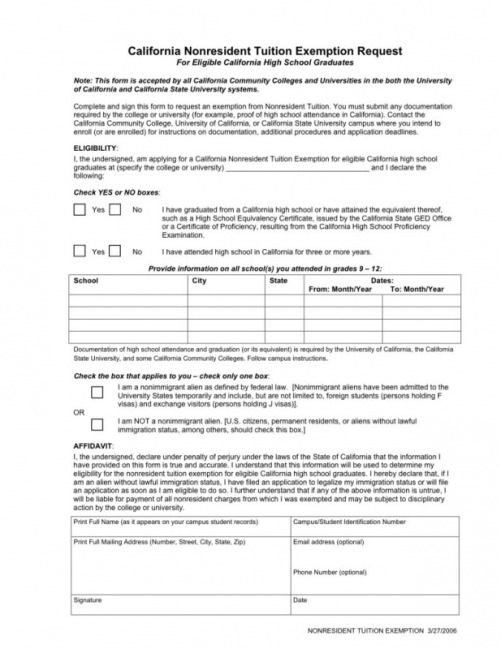Rising Immigrant Scholars through Education
What is ASSEMBLY BILL 540 (A.B.-540)?
Assembly Bill 540 is a California law that allows eligible students, both undocumented and out-of-state students, to qualify for California in-state tuition at all public University of California campuses (U.C.'s), California State University Campuses (C.S.U.'s), as well as all Community Colleges within the State. The Bill was signed into law on October 12th, 2001 by Governor Gray Davis and continues to be in effect. An undocumented student qualifying for A.B.-540 does not change his/her immigration status and is still ineligible for Federal and State Financial Aid support. All information remains confidential (see below).
Students are eligible for the A.B.-540 exemption if they meet ALL of the following requirements:
For the UC and CSU campuses, the A.B.-540 Nonresident Tuition Exemption form is filed after you are accepted. For community colleges, you submit the AB540 request form the same day that you register at the admissions office. You should contact the college/university you will attend about additional instructions on due dates, since it differs among the UC, CSU and community college systems.
For all three school systems, check "Yes" for the first two questions. These first two questions are:
PRIVACY CONCERNS:The Family Educational Rights and Privacy Act (FERPA) (20 U.S.C. § 1232g; 34 CFR Part 99) is a Federal law that protects the privacy of student education records. The law applies to all schools that receive funds under an applicable program of the U.S. Department of Education. As a result, universities cannot release the student’s information, including the fact that they are undocumented, except under very specific circumstances, such as a court order. All information, therefore, remains confidential and will not be released to Immigration Customs and Enforcement.
Colleges have strict campus policies and practices about the release of student information. To see an example of such a policy take a look at Releasing Student Information on the California State University, Long Beach's Enrollment Services website.
In addition, professional ethics prohibit the disclosure of personal information for certain professionals on campus. The Ombudsman, Psychologists in the counseling centers, and others are obligated to maintain confidentiality and will release students’ private information to other university professionals only when there is “a need to know”, and with the students’ permission. Normally, students should not fear being “outed” on campus. Prudence, however, is always advised. Students must never state that they are U.S. citizens.
Students are eligible for the A.B.-540 exemption if they meet ALL of the following requirements:
- Attended a California High School for 3 or more years;
- Graduated from a California High School and/or received the equivalent, such as a G.E.D.;
- Submitted an affidavit (a written promise) to the California Public College or University where student is attending or plans to attend. This statement declares the student as meeting all A.B.-540 requirements; and if the student is undocumented, he/she has filed an application to adjust their immigration status OR will do so as soon as he/she is eligible to do so.
For the UC and CSU campuses, the A.B.-540 Nonresident Tuition Exemption form is filed after you are accepted. For community colleges, you submit the AB540 request form the same day that you register at the admissions office. You should contact the college/university you will attend about additional instructions on due dates, since it differs among the UC, CSU and community college systems.
For all three school systems, check "Yes" for the first two questions. These first two questions are:
- [YES]I have attended high school in California for three or more years.
- [YES] I have graduated from a California high school or have attained the equivalent thereof, such as a High School Equivalency Certificate, issued by the California State GED Office of a Certificate of Proficiency, resulting from the California High School Proficiency Examination.
- [YES]I am NOT a non-immigrant alien. [Non-immigrants, as defined by federal law, have been admitted to the United States temporarily and may have been granted one of the following visas: A,B, C, D, E, F, G, H, I, J, K L, M, N, O, P, Q, R, S, T, TN, TD, V, TROV, and NATO].
- [YES]I am NOT a non-immigrant alien (including, but not limited to, a U.S. citizen, permanent resident, or an alien without lawful immigration status).
PRIVACY CONCERNS:The Family Educational Rights and Privacy Act (FERPA) (20 U.S.C. § 1232g; 34 CFR Part 99) is a Federal law that protects the privacy of student education records. The law applies to all schools that receive funds under an applicable program of the U.S. Department of Education. As a result, universities cannot release the student’s information, including the fact that they are undocumented, except under very specific circumstances, such as a court order. All information, therefore, remains confidential and will not be released to Immigration Customs and Enforcement.
Colleges have strict campus policies and practices about the release of student information. To see an example of such a policy take a look at Releasing Student Information on the California State University, Long Beach's Enrollment Services website.
In addition, professional ethics prohibit the disclosure of personal information for certain professionals on campus. The Ombudsman, Psychologists in the counseling centers, and others are obligated to maintain confidentiality and will release students’ private information to other university professionals only when there is “a need to know”, and with the students’ permission. Normally, students should not fear being “outed” on campus. Prudence, however, is always advised. Students must never state that they are U.S. citizens.

